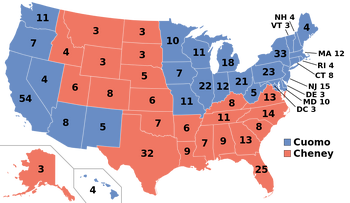Republican Primary
Early speculation
The 1996 Republican Party Presidential Primaries featured what was then one of the largest primary fields seen in decades,eventually including 12 candidates.
Initially thought to be a frontrunner, New York City Mayor Rudy Giuliani declined to run for the Republican Party nomination, citing an obligation to his duties as Mayor of New York City. The potential for a Giuliani-Cuomo match up attracted significant media attention, mainly due to Giuliani and Cuomo's close personal friendship. With Giuliani out, Senate Minority Leader Bob Dole became the main frontrunner in early polling.
Speculation on prospective candidates centered around Giuliani, Dole, former Vice President Dan Quayle, Massachusetts Governor Bill Weld, and Texas Senator Phil Gramm, among others. Businessman George W. Bush, son of former President George H.W. Bush, was also subject to widespread speculation, but ruled out the possibility after losing the Texas Governor's race in 1994. George H.W. Bush's other Son, Florida Governor Jeb Bush, declined to run as well, having been only recently elected as Governor.
Early 1995: Buchanan, Gramm and others enter the race
Lynn Morley Martin, former Secretary of Labor and U.S. Congresswoman, became the first candidate to enter the race, announcing in late February of 1995, but failed to capture any major traction. She would be joined shortly by Senators Arlen Specter (PA) and Richard Lugar (IN), both considered moderates within their parties, but like Martin, failed to capture widespread support.
Texas Senator Phil Gramm became the first significant candidate to declare his intentions to run. Gramm entered the race as a conservative firebrand, drawing stark contrasts between himself and President Cuomo. Gramm went so far as to denounce the President as an "enabler of unhinged socialism," and called the president a "danger to American values."
In the same vein as Gramm, journalist Pat Buchanan would announce his second Presidential campaign shortly after the Texas Senator. Buchanan has launched a credibly challenge to President Bush in 1992, and was popular among the party's right wing. Buchanan was widely dismissed as a prospective candidate during his intial launch, but a dedicated and loyal fanbase gradually allowed him to expand his base within the party.
Mid 1995: Dole, Paul, and Gingrich shape the field.
Senate Minority Leader Bob Dole of Kansas would be the next to enter the race, declaring his campaign in May of 1995. Dole's entry into the race made him the establishment favorite for the nomination, and his establishment support helped bouy his early fundraising numbers. However, Dole's lead was widely seen as weak. Despite leading the field in name recognition, Dole polled at only 22% in Iowa, narrowly beating out Senator Gramm.
Dole's weakness from the party's right wing was his largest liability. Gramm and Buchanan aligned more with the party's base than the Senate Leader, and Dole's appearance as an older, out of touch, career politician left him open to attack. Two members of congress, Georgia Congressman Newt Gingrich and Texas Congressman Ron Paul, sought to capitalize on that weakness.
Gingrich, a Congressman from Georgia, had served as the second ranked Republican in the House of Representatives until shortly before he began his presidential campaign. Gingrich had gained national notoriety for his "Contract with America," an eight point plan of which Gingrich was the principle author. The Contract, which also formed the basis of Gingrich's presidential campaign, was endorsed by all but two members off the House, and every non-incumbent House of Representatives candidate. Despite the Republican party's failure to capture the House, the Contract made up a key component of the party platform in the 1994 and 1996 elections.
In launching his presidential campaign, Gingrich branded himself as the ideological leader of the Republican party, and blamed Senator Dole for the Contract with America's failures in 1994. Despite having been part of the Party's congressional leadership, Gingrich ran his campaign as if he were a scrappy insurgent, and competed for a base with Buchanan and Gramm.
Ron Paul, a former Congressman from Texas, also ran an insurgent campaign. Paul, a libertarian Republican, had ran a third party campaign for President in 1988, and had allied himself with Pat Buchanan in 1992. He frequently criticized Republican leaders in the build up to his announcement, including Senator Dole and Congressman Gingrich, and had branded himself as an anti-establishment candidate, and ran on a platform emphasizing fiscal issues first and foremost. His unique campaign style and brand of politics attracted support for his campaign from across the ideological spectrum of the Republican Party. In contrast to the network of larger financial donors, Paul built a shoe-string campaign out of a coalition of younger voters, small business owners, and libertarian activists. His campaign initially raised barely enough money to afford to pay the utility bills on his handful of field offices in the early states, and the Congressman only employed a small number of paid employees. With these fundraising difficulties in mind, Paul made a strong push in several early states, including Iowa, Alaska, and New Hampshire.
Financial difficulties aside, Paul's campaign suffered from other issues as well. The Congressman was little known outside of his home state of Texas, and failed to qualify for the first primary debate held by the Republican National Committee. On top of that, his prior support for abortion rights had led him into conflict with the socially conservative parts of the Republican base. Despite proclaiming himself "Ronald Reagan's biggest fan" at his launch event in New Hampshire, Paul's social views often brought him into conflict with Reagan's evangelical base. Despite this, he carved out a substantial enough base to remain in the race.
A few additional minor candidates entered the race at this time, including former Tennessee Governor Lamar Alexander and California Congressman Bob Dornan, but neither man caught any traction in the primary.



